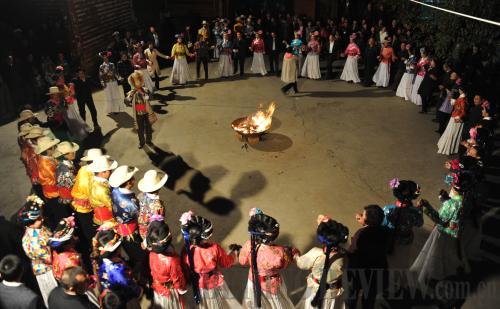|
 |
|
JOYFUL EVENING: Visitors join a bonfire dance of Mosuo people in Yunnan Province (XINHUA) |
Our destination was Lugu Lake—supposedly home to the only matriarchal society left on Earth. This unique civilization is based around the banks and beaches of the lake, a spectacular alpine body of water which straddles the Sichuan and Yunnan border in southwest China. Sitting at an altitude of 2,685 meters, it is officially the highest lake in either province.
We didn't quite believe that a society like this could exist, and if it did, how it could function peacefully. We boarded the Lugu Lake-bound bus to investigate.
Though a handful of China's 55 ethnic minority groups are represented here, including Yi and Pumi peoples—it is the Mosuo and the dominant role of their women in society that attract visitors. These people may number a mere 40,000 in total, yet their principles and behavior challenge some of the world's most conventional and enshrined beliefs about domestic life.
Sexual encounters are decided exclusively by the pair involved—free from stigma and prejudice. Other family members, males included, are not concerned with the romantic lives of their women. Uninhibited by the views of males or outsiders, Mosuo families look at sexuality as a separate entity to domesticity. Many Mosuo husbands are not even sure they are the father of their wife's child.
It's generally accepted that parents who engage in extra-marital sexual affairs are immoral and selfish. They jeopardize the stability of their home-life, which is inextricably linked to their partner and child(ren). In most situations, a partner who finds out that their other half has been unfaithful is heartbroken and more often than not this act would signal the beginning of the end for "happy families." Not in Lugu Lake, it would appear; here we experienced one of the most curious parts of this journey—when we were told by a hotel worker that the local language did not have a word for "jealous."
The road to Lugu Lake isn't as bad as we had been led to believe it would be. Yunnan Province has clearly invested heavily in its transport network. We threw our bags down in a hotel in the town of Lige. We rented electric bikes and set out for an afternoon. The scale of the lake became overwhelmingly apparent and there was no way to go all the way around it before nightfall. We had taken food with us and decided to have a picnic next to the lake. The next day, we spent the day exploring the villages of both Lige and Luoshui.
Lige seems to be the only tourist destination in China that has managed to strike "the perfect balance." The town has been able to attract enough tourists to give the place vibrancy but stopped short of allowing tourists to run-a-mock or to fall for the short-term riches of over-development.
Lige is more user-friendly than Luoshui. There were as many spots of immense natural beauty, but as it was less visitor-oriented, less places to sit down and appreciate the scenery. Restaurants had no English menus or pictures to point at, which makes it a more authentic experience, but definitely a more complex one.
We were there to find out answers, though, not to sit back and stare at the lake.
We set out in search of locals who could clear a few things up for us. At a barbecue stall in town, we found what we were looking for. We asked some young men and women to explain what they think about the outsiders' perception of their culture.
They were eager to explain the "common misconception" regarding the "promiscuity" of Mosuo women.
"While it is possible for a Mosuo woman to change partners as often as she likes, few Mosuo women have more than one partner at a time," we were told.
It was impossible to tell whether these were the proud and defensive words of young and protective men, or the truth.
Some analysts maintain that Mosuo women were open to regular sexual encounters with different partners as it wasn't stigmatized like elsewhere. Even a place as remote as Lugu Lake is not immune to a certain amount of outside influence, and some argue that cultural integration with other ethnic groups (who follow conventional views about marriage and romance) is the only reason why Mosou men now feel embarrassed.
It was hard to say whether the Mosuo society is truly matriarchal. Women were afforded a higher social standing but it seemed more like a custom being acknowledged more than anything based on today's reality. Indeed, an elderly woman we spoke to said that although the day-to-day financial costs of life are dealt with and budgeted for by the woman of the house, any large scale purchase (a house or a car) was the decision of men. This didn't fit into our idea of a matriarchal society.
We concluded that although commonly described as a matriarchal culture, the truth is much more complicated than that, and really defies categorization in traditional models. In general, it is true that Mosuo women take a leading role in the family (owning property, making business decisions, etc.); and that women have more power and autonomy in many regards than in many other cultures. But there are many non-matriarchal facets of their culture, as well.
The Mosuo are, to many people—including us—one of the most fascinating minority groups in China. The beauty of the lake is almost unrivalled in Asia and an absolute must see for anyone in the southwest of China.
The author is a Briton living in China | 